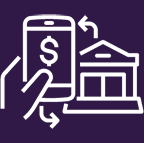DoubleCheck
We are proud to offer a new, helpful service for all members called DoubleCheck Solutions.
Whenever you have Non-Sufficient-Funds (NSF) in your checking account to cover a payment you made, you will be sent a special alert by text or email. This alert gives you time to take action and rectify the situation before your transaction is declined, ensuring critical payments like rent or utilities get paid, while protecting your reputation and credit rating.
DoubleCheck also offers alternative payment options to add funds to your account after the fact, adjust how your overdraft protection was applied, or use a credit card to cover expenses.
How DoubleCheck Works

Receive notification of a Non-Sufficient Funds transaction and the timeline to act

Review the transaction by logging into your Online Banking system

Pay for the transaction with convenient new options, or allow it to return unpaid
Let's Break it Down...

If you had conducted one or more transactions with your Del-One checking account that would overdraft the account (bring the balance below zero), you will get a text message or email alert message like this:
“Your Del-One account ending in 1111 has insufficient funds for one or more transactions. Visit www.del-one.org or visit a branch before 4:00PM on October 8th to review your resolution options.”

After clicking the link, you’ll enter your normal credentials to access Del-One’s online or mobile banking site. Once you’ve logged in, select “Tools” in the navigation menu and select “DoubleCheck”.

Follow the instructions to decide how to pay for the potential NSF, including agreeing to the service charge. You only pay the service charge if you use DoubleCheck to make any changes. It doesn’t cost anything to login and view your transactions. The fee is applied only after you elect to make changes.
Need More Information?
Take a few minutes to watch this series of video tutorials that will show you what the platform looks like and includes step-by-step instructions on how to use it.
DoubleCheck is a great solution to help you avoid the negative consequences of bouncing a payment including damaged relationships or a hit to your credit rating. You will also save money by avoiding late fees from service providers, as well as returned payment fees from the bank or credit union of the business that received the bounced payment.
